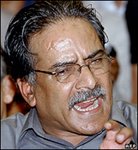 All those folks around Narayanhity palace who Prime Minister Pushpa Kamal Dahal welcomed into his fold for their patriotism, it turns out, actually abhor the Maoists. Superficially, Dahal’s attempt to blame the ex-royals in the midst of his ex-rebels for the spate of vicious attacks on the media is not illogical.
All those folks around Narayanhity palace who Prime Minister Pushpa Kamal Dahal welcomed into his fold for their patriotism, it turns out, actually abhor the Maoists. Superficially, Dahal’s attempt to blame the ex-royals in the midst of his ex-rebels for the spate of vicious attacks on the media is not illogical.Former king Gyanendra, for one thing, purportedly informed Indian Ambassador Rakesh Sood that most of his supporters had now become Maoists. The media behemoths in question, moreover, were among the most vociferous critics of the royal regime.
The anti-palace alliance between the mainstream parties and the Maoists may have been contrived in New Delhi. The momentum for a full-blown movement against the king could not have been built several months later without the complicity of our own media organizations.
Means, motive and opportunity? Yes. But what if rank-and-file Maoists are the ones who hold that grudge most tightly? It’s not that long ago that the media lavished praise on the Maoists for raising arms for the people and contrasting that with the Royal Nepalese Army’s thirst for the blood of the masses. The agility with which reporters and editors bent over backwards to boost the Maoists during the years of elected governments in a clear effort to discredit the parties in power will remain etched forever in the annals of that era.
The mainstream parties made the Maoists partners in progress toward a new Nepal in full knowledge of what they were and could eternally be. The media almost universally cheered the union. Today, the Maoists’ real agenda may be nebulous even to the most committed of former people’s warriors. But that alone doesn’t make it any less worthy of pursuit for an ideologically hardened band incapable of faking any trace of political or military defeat.
So when the Nepali Congress, the Unified Marxist-Leninists and other parties whine over how the former rebels have not really changed their ways, they are in fact underscoring their own abject dereliction of responsibility as parties to the peace process. If there was any wisdom in making the complete renunciation of violence and return of seized property secondary to the imperative of holding elections, then it became the duty of the media as well to justify that trade-off. Instead, they became unabashed partisans for non-Maoist parties on the eve of the elections.
The outcry against the media attacks has forced Prime Minister Dahal to heed some of the demands of the Nepali Congress, which had been making forlorn efforts in the legislature. Dahal may yet choose to fortify his flank by signing that extradition treaty with India and positively considering New Delhi’s proposal for the construction of a high dam on the Koshi.
Even if the pressure on the government were to subside as a result, the larger question certainly won’t. If the Maoists were deemed competent and credible enough to bring down the monarchy and raise the banner of democracy, why should they be considered unworthy custodians of the change? You don’t have to be a Maoist to be all ears for an answer from the media.



















